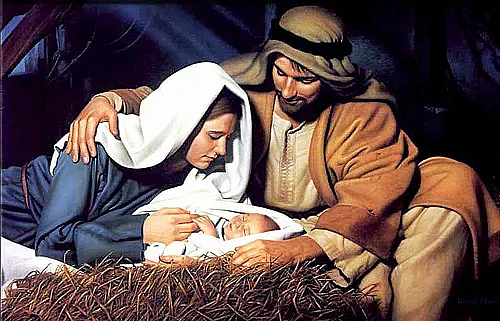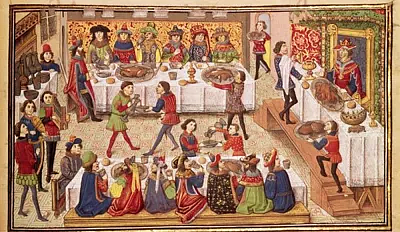Christmas is one of the most important festivals of the Christian community and they celebrate this festival with great enthusiasm and fervor. As the crucial day is fast approaching and is celebrated annually on December 25, on an auspicious day, Christian people remember Jesus Christ (son of god), recall his sacrifice and do a mass service which commemorates the nativity in Bathelam. While today it is associated primarily with the birth of Jesus Christ, Christmas has evolved from various traditions, ancient customs, and influences from across centuries. The origins of Christmas reflect a blend of early Christian traditions with pre-Christian, pagan rituals, creating the multifaceted holiday we recognize today. Let’s get into the details of the origin and history of this festival.
Merry Christmas 2024: The Historical Origins Of The Holiday
Find out the ancient roots and historical origins of Christmas, blending Christian traditions with pre-Christian customs.

Origin of Christmas celebration

Christmas is celebrated annually on December 25 to commemorate Jesus’s birth in Bathelam. The festival holds a significant place in the hearts of Catholic people or who follow Christianity. The festival traditionally starts on December 24, when several people gather together to celebrate Jesus’s birth at midnight. Many people attend a midnight mass or church service that starts on December 24th and lasts into the early hours of December 25th. On the auspicious day of Christmas, several churches hold morning services to honour the birth of Jesus Christ, with start times ranging from early morning by 6:00 a.m. to 7:00 a.m.
Furthermore, this date was most likely chosen to correspond with existing pagan winter solstice celebrations, such as the Roman Saturnalia. By synchronizing the commemoration of Jesus' birth with these festivities, the church hoped to convert pagans to Christianity. Christmas is deeply significant, both religiously and culturally. For Christians, it is a holy day commemorating the birth of Jesus Christ, whom they consider to be the Messiah and Son of God. His birth is interpreted as a fulfilment of biblical predictions and a symbol of hope and salvation for humanity.
Ancient pagan roots and winter solstice celebrations

Before the advent of Christianity, December was a significant time of celebration for many cultures, particularly around the winter solstice, which typically falls between December 21 and 23 in the Northern Hemisphere. The winter solstice, the shortest day of the year, has been celebrated for millennia by various cultures around the world. Ancient pagans recognized the solstice as a significant turning point, marking the symbolic death and rebirth of the sun. They held festivals and rituals to honour the sun god and ensure its return, often involving bonfires, feasting, and the exchange of gifts. These ancient traditions have left a lasting impact on modern winter solstice celebrations, including Christmas, which incorporates elements like Yule logs, evergreens, and the exchange of gifts.
The Birth of Jesus Christ, the Messiah

The birth of Jesus Christ, a central event in the Christian faith, is believed to have occurred in Bethlehem. The exact date of Jesus' birth remains uncertain, but the early Christian church chose to celebrate his birthday on December 25, which likely coincided with the Roman winter solstice festivals. The Gospels of Matthew and Luke provide differing accounts of the events surrounding his birth, including the visit of the Magi from the East and the shepherds' encounter with angels. Early Christian celebrations focused on commemorating Jesus' birth and the significance of his coming as the Messiah. These celebrations gradually evolved into the elaborate rituals and traditions associated with Christmas today.
Medieval Christmas

Medieval Christmas was a captivating blend of religious devotion and festive revelry. While the season held profound spiritual significance, it also provided an opportunity for merriment and community celebration. Elaborate church services and processions honoured the birth of Christ, while lavish feasts, drinking, dancing, and games filled the days between Christmas and Epiphany. Entertainment became a prominent part of the holiday, with performances known as mummers’ plays, where actors would dress up and perform stories. These festivities often incorporated elements of older pagan traditions, blurring the lines between sacred and secular. Despite the potential for excess, Medieval Christmas offered a welcome respite from the harsh winter months, fostering a sense of joy and togetherness.
Puritan opposition and the rebirth of Christmas in the 19th century

The Puritans, a Protestant group in 17th-century England, opposed the celebration of Christmas, viewing it as a remnant of Catholic traditions and sinful indulgence. They succeeded in banning Christmas celebrations in England for a brief period during the Commonwealth era. However, the holiday's popularity endured, and it experienced a revival in the 19th century, fueled by increased commercialization, sentimental literature, and the influence of German traditions like the Christmas tree. This led to the emergence of the familiar Christmas traditions we know today, including gift-giving, festive decorations, and the figure of Santa Claus.
Modern Christmas Celebration

Modern Christmas celebrations are a blend of religious and secular traditions. Key elements include decorating Christmas trees adorned with lights and ornaments, exchanging gifts, and sharing festive meals with loved ones. Many families attend church services and participate in carol singing. The figure of Santa Claus, delivering presents on Christmas Eve, is a beloved part of the celebration, especially for children. While the religious significance of Christmas remains central for many, the holiday has also evolved into a time for family gatherings, community events, and spreading goodwill.
Significance of Christmas
The festival Christmas has its origins in religious celebration, but later the day becomes a holiday that celebrates universal themes like generosity, family, and goodwill. For many, it’s a time to reflect on the year, connect with loved ones, and extend kindness to others, regardless of religious beliefs. Today the spirit festival continues to evolve, blending ancient customs with new traditions. This unique convergence of history, spirituality, and culture is what makes Christmas a celebration that resonates with people of all backgrounds around the world.
The festival of Christmas illustrates how a single holiday can weave together diverse traditions and values. Christmas remains a dynamic and meaningful holiday that brings people together across faiths and continents. It’s a celebration that endures, constantly adapting while retaining its core themes of joy, generosity, and hope. We from our hearts wish you that this Christmas brings all the joy, happiness and love to your life.
Merry Christmas!
















